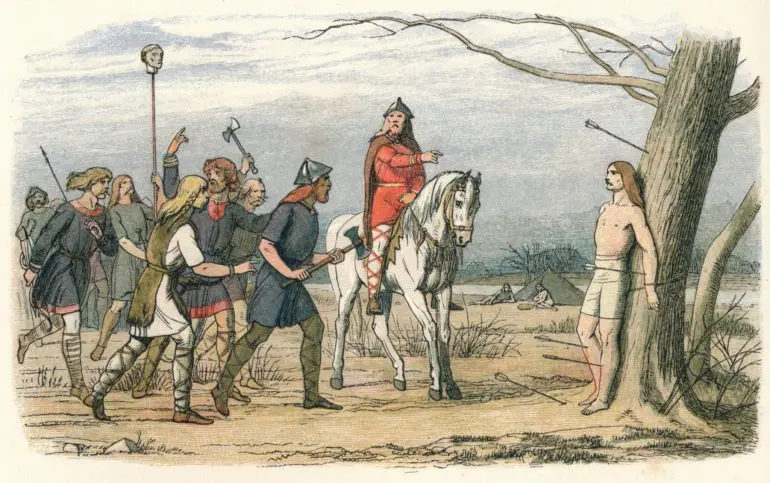King Burgred’s Struggle Against the Vikings
Imagine stepping back in time to 9th-century England, a land fragmented into numerous kingdoms under constant threat from Viking raids. This is the world of King Burgred, who ruled Mercia from 852 to 874 AD. His reign, marked by both strategic alliances and crushing defeat, exemplifies the challenges faced by Anglo-Saxon rulers during this turbulent era.
Upon ascending to the throne, Burgred recognized the looming Viking threat. He strategically married Æthelswith, daughter of King Æthelwulf of Wessex, in 853 AD. This union created a powerful alliance against their common enemy. [However, the Viking presence in England intensified with the arrival of the “Great Heathen Army” in 865 AD.
Initially, Burgred, like many rulers of his time, attempted to buy peace with the Vikings through payments of tribute. However, this tactic proved unsustainable. The Vikings, driven by ambition and the lure of riches, continued their advances. By 874 AD, they had reached Repton, Mercia’s capital. The ensuing conflict proved disastrous for Burgred. Facing overwhelming odds, he was forced to flee his kingdom, seeking refuge in Rome.
The Fall of Mercia and Burgred’s Legacy
Burgred’s flight marked the end of Mercia as a truly independent kingdom. While the Vikings installed Ceolwulf II as a puppet ruler, Mercia effectively came under their control. This marked a significant turning point in English history, demonstrating the Vikings’ growing power and the shifting balance of power within the Anglo-Saxon world.
Burgred died in exile in Rome in 888 AD. His story, though ultimately one of defeat, highlights the courage and difficult choices faced by rulers during the Viking Age. He is remembered as the last true king of an independent Mercia before the Vikings radically reshaped the political landscape of England.
Who Was the King of Wessex in Vikings? Separating Fact from Fiction
The popular TV series “Vikings” has sparked significant interest in this period of history. However, it’s crucial to remember that the show takes creative liberties for dramatic effect. This is particularly evident in its portrayal of the Wessex monarchy during the Viking Age.
While the show features King Ecbert of Wessex as a contemporary of Ragnar Lothbrok, the historical timeline differs. Ecbert actually died in 839 AD, decades before the arrival of the “Great Heathen Army” depicted in the series. The Wessex king who truly faced the brunt of these invasions was Ecbert’s grandson, Alfred the Great.
Alfred the Great: A King Forged in Conflict
Alfred the Great ascended to the Wessex throne in 871 AD amidst the chaos of escalating Viking attacks. Unlike his grandfather, Alfred’s reign was defined by constant warfare against the Vikings. His story is one of resilience and strategic brilliance.
One of Alfred’s most notable victories occurred at the Battle of Edington in 878 AD, where he decisively defeated the Viking forces. This triumph proved to be a turning point in the conflict, eventually leading to a truce and the establishment of the Danelaw, a region in eastern England under Viking control.
Alfred’s legacy extends beyond his military achievements. He is also celebrated as a wise ruler who implemented significant legal and educational reforms, earning him the epithet “the Great.” His reign marked a turning point not only for Wessex but for the survival of Anglo-Saxon culture in the face of Viking expansion.
Who Was the King of Mercia in Vikings? Navigating a Complex History
“Vikings” features King Burgred of Mercia, offering a glimpse into the challenges faced by this kingdom during the Viking Age. However, the series’ depiction of Burgred, while entertaining, blends historical fact with dramatic license. Let’s delve into a more nuanced understanding of the Mercian kings and their encounters with the Vikings.
Burgred and the Struggle for Mercia
As discussed earlier, King Burgred inherited a kingdom already feeling the pressure of Viking raids. His marriage to Æthelswith of Wessex, a pivotal event in his reign, exemplifies the complex web of alliances and rivalries that characterized this period. Facing the growing might of the “Great Heathen Army,” Burgred initially employed a combination of resistance and diplomacy.
The historical record suggests that Burgred, along with his West Saxon allies, engaged in several confrontations with the Vikings. However, as the Vikings grew more powerful, Burgred, like other rulers, resorted to paying tribute in an attempt to safeguard his kingdom. Unfortunately, this tactic proved unsustainable in the long run. The Vikings, driven by ambition and opportunity, continued to expand their influence.
Beyond Burgred: Exploring the Fate of Mercia
Burgred’s flight into exile in 874 AD had significant consequences for Mercia. The Vikings, now firmly in control, installed Ceolwulf II as a puppet king. While Ceolwulf’s reign lasted until 879 AD, he ruled a fractured and diminished kingdom, a shadow of its former glory.
The exact circumstances surrounding Ceolwulf’s death and the final years of his reign remain shrouded in some historical uncertainty. Regardless, his reign serves as a stark reminder of the Vikings’ impact on the Anglo-Saxon world. The once-powerful kingdom of Mercia, much like its neighbors, had been irrevocably transformed by the Viking onslaught.
Unraveling the Historical Tapestry
It’s important to note that our understanding of this period is based on a combination of historical sources, some more reliable than others. The Anglo-Saxon Chronicle, a collection of historical records in Old English, provides valuable insights into the reigns of these kings. However, like all historical sources, it’s essential to consider potential biases and limitations.
By critically engaging with both historical sources and popular depictions like “Vikings,” we gain a richer and more nuanced understanding of the Viking Age and the individuals who shaped it. The story of King Burgred serves as a poignant reminder of the challenges, triumphs, and tragedies that unfolded during this transformative period in English history.
- Unveiling the Enigma: Mansoureh Khojasteh Bagherzadeh’s Public Appearances & Private Life in Iran - July 18, 2025
- Unveiling the Mystery: Mansoureh Khojasteh Bagherzadeh’s Husband: A Rare Glimpse into a Private Life - July 18, 2025
- Unveiling Masoud Khamenei’s Mother: Power, Influence, and Iran’s Future - July 18, 2025
















